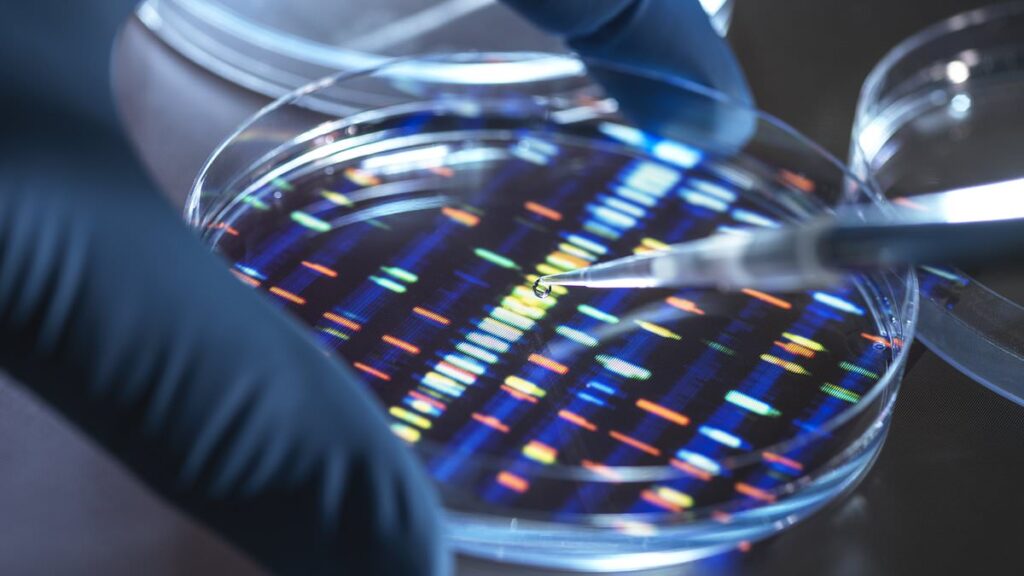
Scientists have embarked on a groundbreaking yet controversial journey to create synthetic human DNA from scratch, a venture that some critics equate to ‘playing God.’ This ambitious research aims to unlock innovative treatments for autoimmune disorders, heart failure, viral infections, and age-related diseases. The project involves developing sophisticated tools to construct large, complex sections of human DNA in laboratories and inserting them into skin cells to observe their functionality.
The ultimate objective is to assemble entire human chromosomes, a crucial step toward crafting a fully synthetic human genome. However, the initiative has ignited ethical and safety debates. Experts caution that such technology could pose catastrophic risks, potentially leading to the creation of biological weapons or genetically engineered ‘designer babies.’
‘The genie is out of the bottle,’ said Professor Bill Earnshaw of the University of Edinburgh. ‘If an organization with the right equipment decided to start synthesizing anything, I don’t think we could stop them.’
Scientific Ambitions and Ethical Concerns
While the scientific community is driven by the potential to revolutionize medical treatments, ethical concerns loom large. Dr. Pat Thomas, a longtime advocate for genetic ethics, emphasized the dual-use nature of this science. ‘While many scientists have good intentions, the science can be repurposed to harm, and even for warfare,’ she noted.
DNA, the molecule carrying genetic instructions for life, is present in every human cell except red blood cells. Composed of four chemical bases—A, G, C, and T—these letters form the genetic code that influences everything from eye color to disease susceptibility. Over the next five years, teams from prestigious institutions such as the University of Oxford, Cambridge, Kent, Manchester, and Imperial College London will collaborate to build and test synthetic DNA in laboratory settings.
Potential Medical Breakthroughs
The short-term goal of this research is to enhance understanding of how DNA influences human development, health, and aging. By constructing DNA from scratch, rather than editing existing strands, scientists gain unprecedented control to explore genetic functions and test new biological theories. This approach could unveil the mechanisms by which faulty cells trigger diseases or lead to the creation of disease-resistant tissues and organ repair techniques.
‘This is about developing therapies that will improve people’s lives as they age, leading to healthier aging with less disease,’ Dr. Julian Sale of Cambridge’s MRC Laboratory of Molecular Biology told the BBC.
Dr. Sale also highlighted the potential to explore the ‘dark matter’ of the genome—the vast, poorly understood regions of DNA that do not code for proteins but may play critical roles in cellular function. While the development of medical treatments may still be years away, the research could eventually lead to groundbreaking therapies, such as virus-resistant tissues, lab-grown organs, or advanced cell-based medicine.
Broader Implications and Potential Risks
Professor Matthew Hurles of the Wellcome Sanger Institute suggested that this work could revolutionize treatment by revealing why certain cells cause disease and how to rectify them. ‘Building DNA from scratch allows us to test out how DNA really works and test out new theories, because currently, we can only do that by tweaking DNA in existing living systems,’ he explained.
This approach may also lead to advancements beyond the human genome. Philosophy professor Iain Brassington from the University of Manchester pointed out the potential for creating synthetic mitochondria, the cell’s energy powerhouses, which could assist women with inherited mitochondrial disorders in having children without relying on egg donors. However, Brassington also warned of severe consequences if the technology is misused.
‘Such bugs getting into the environment could be catastrophic,’ he said, referring to lab-engineered bacteria designed to clean up oil spills or digest plastic.
Looking Ahead: Balancing Innovation and Ethics
As scientists push the boundaries of genetic engineering, the ethical implications remain a critical consideration. The balance between innovation and potential misuse of technology will require ongoing dialogue among scientists, ethicists, and policymakers. The path forward involves not only scientific breakthroughs but also a commitment to ethical standards and safeguards to prevent misuse.
The scientific community continues to grapple with these challenges, aiming to harness the power of synthetic DNA for the betterment of human health while remaining vigilant about the potential risks. As this field evolves, the world watches closely, hopeful for medical advancements but mindful of the ethical responsibilities that accompany such transformative technologies.





